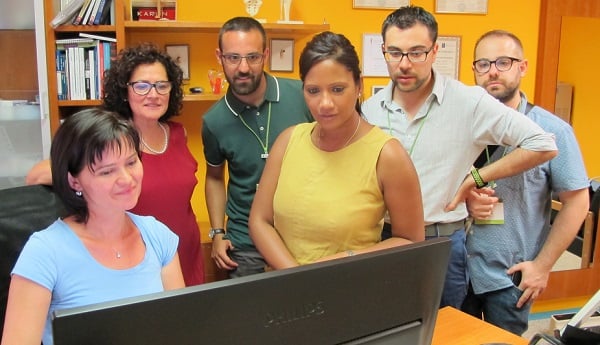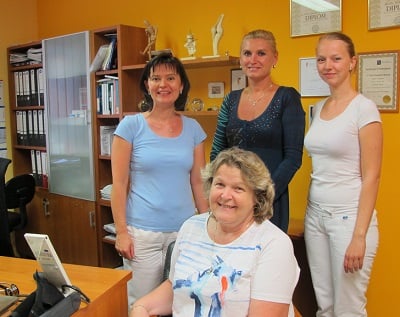A practice visit in Prague by the WONCA Editor
 Photo: Dr Jitka Nováková showing the computer record capacity to
colleagues from Italy - Nicola Pecora, Alessio Platania, Simon Cernesi,
Maria Milano, Leka Satukunananthan (UK).
Photo: Dr Jitka Nováková showing the computer record capacity to
colleagues from Italy - Nicola Pecora, Alessio Platania, Simon Cernesi,
Maria Milano, Leka Satukunananthan (UK).
Just before the opening ceremony of the WONCA Europe conference in Prague, the WONCA editor, Dr Karen Flegg, joined a group of four colleagues from Italy and one from the UK on a practice visit.
We were told that we were visiting Dr Jitka Nováková so it was with some surprise that I found on the door of the practice, the name of Dr Bohumil Seifert, Host Organising Committee chair for the conference. No doubt he was preoccupied with the conference organisation, however, his colleague, Jitka, explained the Czech system of general practice and showed us around the premises.
The practice which was located in Ordinace Karlín, Prague 8, and it is most unusual for the fact that it is a group practice with five doctors (two of whom are trainees) and two nurses. Apparently, most practices in the Czech Republic are solo.
The doctors work at different times in order to cover a five day a week roster for patients with appointments as well as walk-in patients. On two days a week the practice works from early morning until 6 PM and on two other days they are lucky enough to finish the formal work by 1 PM. Home visits are done outside these hours, and of course we all have paperwork to do at the end of our day. There are scheduled times to provide telephone information to patients.
There are three kinds of time slots for an appointment: 10 minutes for a common consultation; 20 minutes for a major consultation; 30 minutes for preventive checks, pre-surgery examination, social assessment etc. The longer timeslots seemed a good thing to assist family doctors to provide an excellent service and as you will read, be competitive with the “subspecialists”.
The practice serves about 3800 patients, most from the local area - all adults, as children see paediatricians as the first point of care. The GP is not the gatekeeper the Czech Republic and patients can, in principle, refer themselves to all "suspecialised" doctors. The practicality is that, most tend to go through the GPs. We wondered if this was a result of the GPs being able to provide a high quality service through longish appointments and add-ons such as point-of-care testing.
The patients contribute to health insurance from their salary and the doctors are paid by the insurance companies. There is a further charge (90 CZK or about USD4) when patients are consulted at home or out of hours.

Practice nurses provide reception services, triage services, ECGs and point of care testing (for CRP and INR for example), and on certain days of the week venepuncture.
Photo: Practice nurses with Dr Jitka Nováková (left) and family medicine trainee, Dr Kateřrina Barčíková (right)
The patient record system is mixed electronic and paper based, but regardless of what is entered into the computer it is also maintained on paper.
The premises were very pleasant with the consulting rooms being large and painted in bright colours. A patient waiting area is decorated with large photographs of actors and other important people (though no family doctors I think) taken by one of the Czech Republic’s famous photographers.
We conclude that while not the gatekeepers, the Czech family doctors have an opportunity to provide high quality care to their patients and thus be in a competitive position with certain sub- specialists.
Thanks to Dr Jitka Nováková for showing us the practice and explaining the Czech health system, and to practice principal, Dr Bohumil Seifert, who unknowingly hosted us in his absence practice visit!